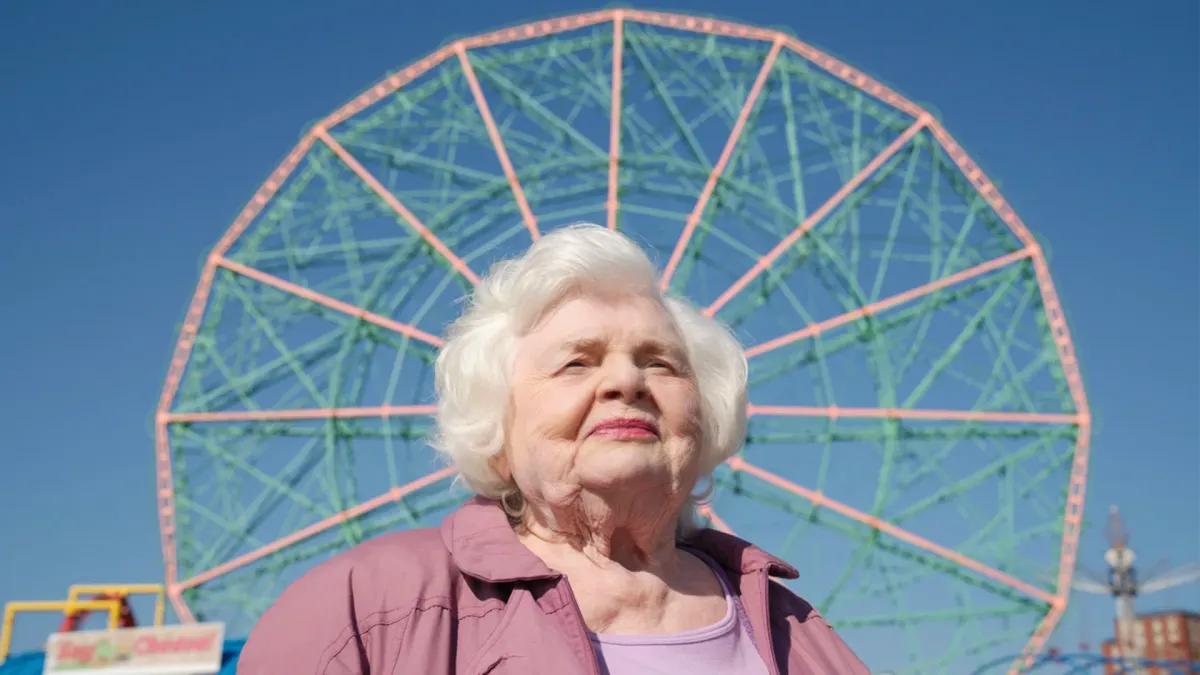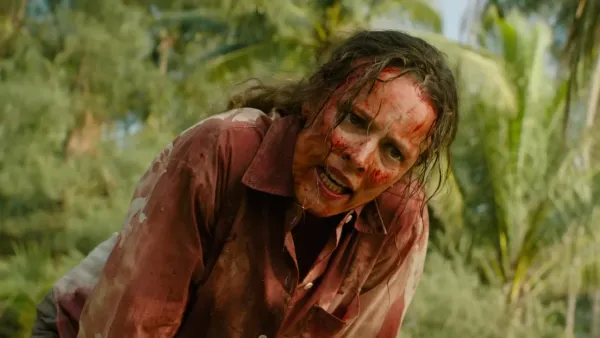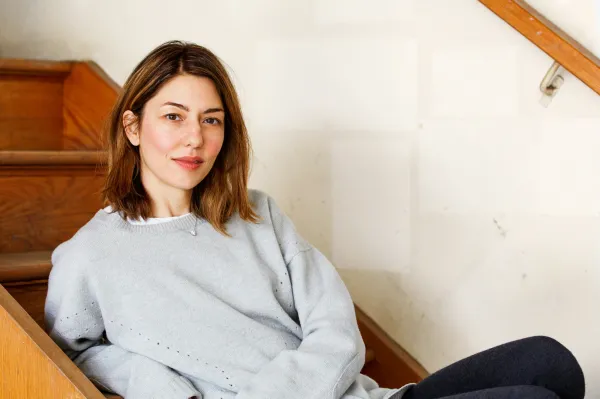'Eleanor the Great' Review: June Squibb Grips Your Heart in Scarlett Johansson's Directorial Debut
June Squibb continues to delight in a story about the stories we tell in grief.

This post is free but it’s worth it to become a paid member of The Film Maven community! Paid subscribers are the backbone of The Film Maven and becoming one shows support for independent journalism, as well as female- and disabled-created content. It also allows me to write really fun articles and hire freelance writers. And becoming a paid subscriber gives you access to The Trade, my examination and exploration of topics in the entertainment industry, my Popcorn Disability articles on disabled representation in film, and more. Subscribe and show your support for independent journalism.
Read more about the history of disability in film by pre-ordering my upcoming book, Popcorn Disabilities: The Highs and Lows of Disabled Representation in the Movies. I not only expand on what you’re reading here, but examine the stereotypes, tropes, and the good, bad (and really ugly) of disabled movies. Preorder the book by clicking this link! Send me proof of your preorder and I’ll give you a paid subscription to The Film Maven for one year!
In last year's Thelma, actress June Squibb told us a hilarious and heartfelt story about growing old and the ways society ignores the elderly wrapped up in a fun action/adventure narrative. There's a similar sentiment that runs through her latest movie, Eleanor the Great.
A story about a great lie and the impact it has on others opens up to explore the need to pass stories on to the next generation, and how often the stories of the elderly are either ignored or exploited, as well as the loneliness that comes when one hits a certain age. Ably handled by Scarlett Johansson, in her directorial debut, Eleanor the Great isn't just another knockout performance by Squibb, but a tender story of friendship, love, and remembrance.
Eleanor Morgenstein (Squibb) is 94-years-young living in Florida with her best friend, and Holocaust survivor, Bessie (Rita Zohar). The pair have lived together for over a decade, sharing twin beds in one room, sharing a life together. But when Bessie dies, Eleanor is forced to move to New York to live with her overprotective daughter Lisa (Jessica Hecht). As Eleanor tries to find a life of her own in New York she accidentally wanders into a support group for Holocaust survivors and, pressured by the group to tell her story, co-opts Bessie's experience as her own. This entices a young college student named Nina (Erin Kellyman) to want to tell Eleanor's "story" as part of her journalism class.
A few critics at larger publications have felt duped by Eleanor the Great, presuming it's a comedy. Maybe because Squibb's last movie was? Or it's possible that they assume a movie starring an elderly woman must be funny because what other genre would they do? (The commonalities/stereotypes between movies about the elderly vs. the disabled are many.) There are certainly moments where Eleanor is funny--going to a synagogue and flipping off a patron, for example--but the majority of the movie is wrapped up in the warmth of two grief-stricken characters finding friendship with each other.
In this case, it isn't just Eleanor who's hurting, but Nina. The young journalism student is struggling with the death of her mother and an absentee father (Chiwetel Ejiofer) who refuses to talk about it. For screenwriter Tory Kamen, the movie is about grieving through communication. How the stories we tell about those we've loved and lost help keep them alive for us. If we don't talk about them, did they ever really exist? That's also the question that fuels Eleanor's choice to take Bessie's story of surviving the Holocaust and passing it off as her own. Bessie demands Eleanor listen to her story about losing her brother, telling Eleanor that once Bessie dies who else will know of her brother at all?
When Eleanor tells Bessie's stories, Johansson chooses to cut to Bessie recounting the tale. Zohar and Squibb have an easy camaraderie with each other indicative of two people who have been each other's shadow for decades. Zohar infuses such emotion and gravitas to her horrific narratives, at one point practically keening in grief for what she's experienced. She only has a limited amount of screentime but Bessie is in every scene, particularly in how Eleanor refuses to let her go, even when the lie eventually makes its way to its foregone conclusion.
Squibb continues to show such nuance in her performances. Eleanor Morgenstein holds little in common with Thelma Post (the main character from Thelma). As Eleanor, Squibb takes on the part of listener. Many of her interactions involve hearing Bessie's stories. Being the vessel by which they're carried out. She holds the same role for Nina, allowing the girl to share her pain outside of her cold household. Cinematographer Helene Louvart pushes the camera in close on conversations between Eleanor and others, forcing the audience to take note of every moment where Squibb expresses confusion, sadness, or joy.
And, yet, Squibb isn't just a receptacle for everyone else's feelings, she also showcases feelings of her own. Her scenes opposite Kellyman are particularly darling, not just in the twee way usually showcased in movies where old people interact with the young. Nina and Eleanor are kindred spirits. They understand the mutual love and appreciation for storytelling. They both, also, desperately, are in need of a friend who understands them. Their bond is so strong that when the third act inevitably sees everything fall apart, the audience is less invested in Eleanor getting back on her feet, but more whether her relationship with Nina can be fixed.
This is really a two-hander between Squibb and Kellyman, with Zohar always lingering (in spirit) in the periphery of scenes. Hecht gets in some moments as the stereotypical overprotective yet absentee adult daughter of Eleanor's. The pair have a decent heart-to-heart in the movie, but it's hard to reconcile with a character complaining about not knowing what her mom does all day while continuing to let her eat dinner alone. The character doesn't get enough meat to make her choices not seem heartless. Ejiofer comes off more like the A-list name meant to sell the movie more than anything. He has a few key scenes as Nina's father, a news journalist, but again he's really there to fulfill the means of reconciling all the characters at the end than anything organic.
Eleanor the Great is another stellar role for Squibb, with Kellyman and Zohar giving in some equally great moments. If these are the types of projects Johansson wants to tell as a director I'm all for it! This was a heartfelt, emotionally resonant story about the power of our lives and the capacity of our stories lingering on long after we've left this world. Take someone you love and see it.
Grade: B
Eleanor the Great hits theaters September 26.
Are you a June Squibb fan? Leave a comment below.
Enjoy what you’re reading? Share it with friends. Help us get to 1,000 subscribers by the end of 2025 and I’ll do a full written and video review of Francis Ford Coppola’s Megalopolis.
Let’s work together! If you have editorial opportunities and would like to collaborate with me on an entertainment or disability project, drop me a message.




